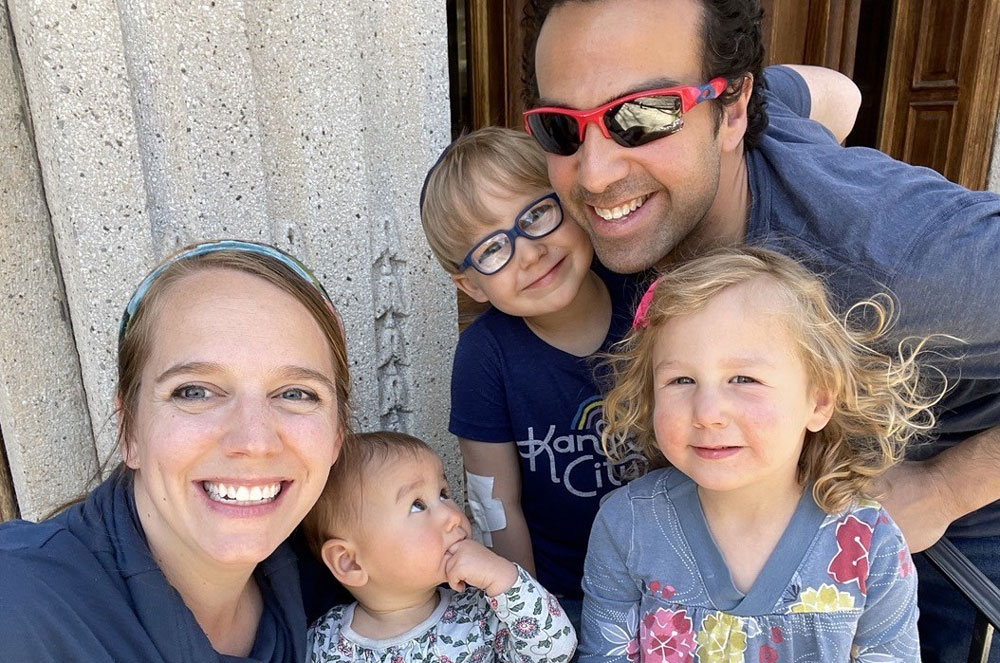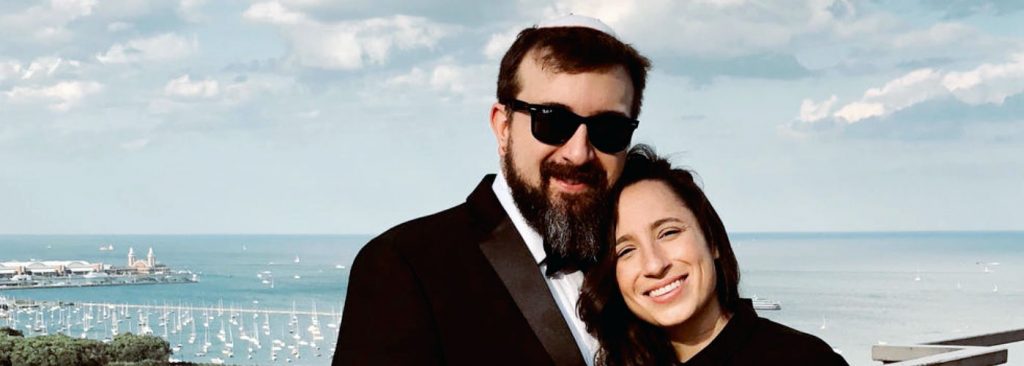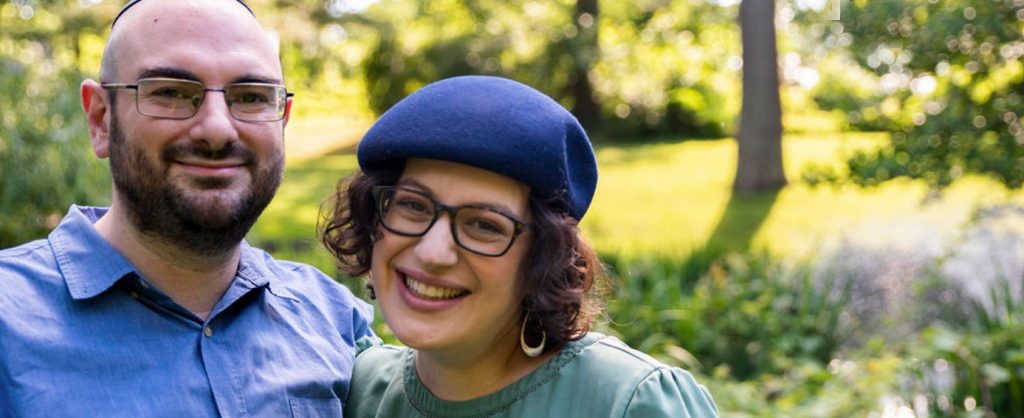News Highlights Finding a Jewish Home Base

Rabbinical School alumni Ezra Balser ’17, Elizabeth Bonney-Cohen ’18 (above) and Sarah Mulhern ’17 are on the forefront of a burgeoning movement designed to meet young-adult Jews where they are.
The Base movement, the brainchild of four 20-something friends from the Upper West Side of Manhattan, was born of the belief that many young Jews today yearn to experience, practice, and celebrate their religious heritage unencumbered by the formal dictates of, say, a synagogue or Chabad house.
Under the program, the home of a rabbinic family (a rabbi and a partner/spouse who may or may not also be a rabbi) serves as the grounding point — or “base” — for communal hospitality, learning and service. (Clever readers will recognize that the Hebrew word for “home” is בית, pronounced as “bās” by speakers of Ashkenazi Hebrew.) Participants gather at their respective rabbi’s home to share Shabbat dinners, celebrate the Jewish holidays, learn from Jewish texts and traditions, develop a Jewish social network and engage in the Jewish value of service.
Since Hillel launched the Base program in 2015, 11 bases have been established in seven U.S. cities. Most base locations now operate under the auspices of Moishe House, including those headed up by Balser and his wife, Laura Elkayam (Chicago—Loop); Bonney-Cohen and her husband, Matt (Boston); and Mulhern and her husband, Rabbi William Friedman (Chicago—Lincoln). And this July, newly-ordained Rabbi Frankie Sandmel`22 and their partner Eliana will launch BASE Bay Area (Oakland-Berkeley).
We asked Rabbis Balser, Bonney-Cohen and Mulhern to discuss their experiences working in this cutting-edge program.
Why did you decide to join the Base movement?
Ezra Balser (above): My wife and I were inspired by the idea of using our home as a center of authentic Jewish experience for those seeking something more in their Jewish lives. We always loved to cook and host, and this was a perfect fit for us.
Elizabeth Bonney-Cohen: Judaism thrives in the home, and inviting young people into ours is one of the most inspiring ways to model the depth and richness Judaism has to offer in the most authentic way I know. It’s a privilege to see Judaism come to life in the eyes of those around our Shabbat table and to see relevant meaning breathed into old traditions around our living room.
Sarah Mulhern: I went to college with some of the folks who founded Base, and it had always sounded interesting to my husband, Will, and me. After spending four years working on the faculty at the Hartman Institute, I felt like I wanted to do something that was a little more rooted in community, where I had the chance to get to know people and make relationships with them in a long-term way. In addition, I was really attracted to the model of doing something in my home.
What in your background prepared you for this experience?
EB: Both Laura and I spent many years working at Camp Ramah, both in Wisconsin and in New England. Our passion for Jewish programming and caring for the next generation of Jews were at the core of our work there. So much of what we do is informed by the way we worked together at camp.
EB-C: I wasn’t raised Jewish, so I know how intimidating it can be to feel on the outside of Jewish community, language and experiences. So many young Jews — whether they were born Jewish or not — feel that same sense of “outsiderness” and struggle to feel ownership of their own tradition. I still remember the first Shabbat dinner I attended in someone’s home; I often say that while I fell in love with Judaism through academic study, it was around that table that I felt Judaism love me back for the first time.
SM: One piece I would mention is my training at Hebrew College — being in a place where I learned from and with teachers and colleagues who were all over the place on everything. Having that pluralistic training was incredible preparation for being in this type of rabbinate, where people haven’t opted into a particular brand of Judaism when they get to me. I’m meeting people who are coming from all different places and backgrounds.
What do you find most rewarding about the job?
EB: Laura and I get to throw Jewish parties for a living, and we can see how it affects people and engages them with real Jewish experiences in real time. The quiet in the room when they are eating our home-cooked food that clearly hits the right spot for their needs — all of that is the reward.
EB-C: I know that the work I do transforms the lives of those I serve. It empowers them to take ownership of their own Judaism — stepping into ritual life for the first time, appreciating new aspects of it and committing to a life of learning and growing in Torah. It inspires them to find themselves among the Jewish people and to seek wisdom from the generations of Jewish wisdom. And it connects them to a sense of being part of something bigger than themselves — to a community, to a people, to the Divine.
SM: I get to meet the most incredible people; having the opportunity to become a part of their lives is such a privilege. It’s also rewarding that I get to do this in my house, in front of my kids. Seeing them experience how much we love Jewishness and seeing them build relationships with the young adults who come into our home is very beautiful for me.
Any drawbacks to mention, specifically regarding opening your home to others in such a dramatic way?
EB: Not particularly. We wanted to let people in to peek behind the curtain a bit to see our home and our lives in the hope that we can serve as one model of a Jewish family for those that come over. All rabbi jobs are hard. This one energizes us in the right ways.
EB-C: There is no real divide between my personal self and my professional self in this work. While that can be exhausting at times, it is also tremendously rewarding to bring my authentic self to this work and to see the ways in which that resonates with those I serve. They aren’t looking for a perfect rabbi; they’re looking for a real one.
SM (above): We do a lot of hard work, but it’s not always glorified work. There’s a lot of nitty-gritty grunt work that comes along with the high-level rabbinical skills we bring to the job. In those instances, I think about the kohanim (Jewish priests); much of what they did was sweep up ashes. But they did that in service to the Jewish people. So, while washing dishes at midnight is not my favorite thing in the world, I’m doing it in service to the Jewish people. And it feels sacred in that way.
Given that the weekly Shabbat dinner is a centerpiece of the program, can you describe in a bit of detail how you celebrate on those evenings?
EB: We celebrate as we would otherwise. People come in, and we offer drinks. When everyone has arrived, we sit down. I usually do a quick go-around asking people to share one thing that helps us welcome them into the space — something they are thinking about or working on, or something going on in their lives that helps us know who they are at this moment. On Shabbat, we welcome in the ministering angels. Lucky for me and Laura, we are blessed to welcome in holy angels to our Shabbat table every week. Then we sing, make kiddush, wash hands and eat!
EB-C: We always include an opportunity for folks to share something meaningful about themselves and where they find themselves in that moment — something that we wouldn’t learn about them from looking at their resumé. This is perhaps the most impactful aspect of our meal, because it invites depth and vulnerable expression that taps into a sacred part of ourselves and elevates the meal from just a time with friends to an opportunity to encounter the Divine.
SM: Our Shabbat dinners can look many different ways. We recently had a dinner for folks who were in their senior year of college. It started out very light-hearted, and then it went to a beautiful conversation about what it means to go out on your own: What are you scared about? What are you excited about? What do you need from each other? What do you need from the Jewish community? What do you want to give to the community? I don’t think I ever sat down and had that kind of intentional, thoughtful discussion at that time in my life.
What other types of hospitality, learning and service programs and activities do you lead each week?
EB: I teach a weekly class on Hassidut and the Parsham, and once a month we host a Shabbat morning minyan and kiddush lunch. We also host holiday parties on Simhat Torah, Purim, Yom Ha’Atzmaut, etc. Pre-COVID, we were volunteering at a local food pantry, though that has been on pause.
EB-C: While COVID has had a major impact on our work — taking much of our learning online or outside over the last two years — we love hosting learning around our living room, Shabbat meals around our dining-room table and service opportunities for folks to give back in meaningful ways to the community. I also do a tremendous amount of one-on-one engagement and pastoral support, which has been especially important during the fragile and traumatizing years of COVID.
SM: During the days, we do a lot of one-on-one pastoral care and getting-to-know-you meetings. In the evenings, we have programs, either drop-in classes or cohort things where you commit to going on a learning journey with a small group of other people. We also hold a drop-in beit midrash twice a month, which is a lot of fun. And in addition to the Shabbat meals, there are also holiday celebrations. We’re not trying to do a full service like you’d find at a synagogue, but we have markers. On Yom Kippur, for example, we’re doing an intentional Kol Nidre, with reflection time. We do monthly service in the community where we take Basers to make dinner for folks who are facing hunger in our community, and we’re trying to fill out some more of that stuff.
What is the size and the makeup of your community?
EB: We see hundreds and hundreds of people each year. On a weekly basis, we’re hosting probably 15 to 20 for Shabbat dinner, and I am meeting with many more throughout the week. They, generally speaking, want to make friends and find community. In our community, people come to us for our chill and warm vibes, our cooking and our unabashed love for Israel.
EB-C: Each year, we engage around 400 unique individuals. Our weekly attendance varies pretty dramatically based on the program. A holiday party will draw around 40 to 50, while learning might draw 10 to 20 and a Shabbat dinner around 10. Our community is diverse in terms of relationship to traditional religious practice, but the thing that brings them together is their desire for depth of connection — to Judaism, to each other and to a meaningful life. In many ways, they are a community of seekers, looking to take seriously Jewish wisdom and grow in their Jewish identities alongside fellow journeyers.
SM: We work with folks 18 to 39 who, as you can imagine, are in a number of different stages of life. That includes college students at campuses around Chicago; folks in the immediate postcollege moment; young couples; and people in their 30s, who may be more settled in the city and in their careers but who are still trying to figure out where their place is Jewishly. In terms of Jewish diversity, we see folks who are active members of the liberal Orthodox shul who are looking for a more-centered egalitarian space; we see folks who are active members of the local Conservative shul who may want to supplement that with something home-based or targeted to people in their 20s or 30s; we see folks who are part of the liberal Reform community; and we see folks who have never stepped inside a synagogue. That’s the beauty of Base.
What is it like partnering with your spouse in this endeavor?
EB: It’s a dream for me to work with my best friend in this holy work. We jumped at the opportunity to work together again after a few years off from camp. It’s not always easy, but we are constantly communicating, and we have developed a pretty good system for how we host and how we move around our space. Sometimes, all we need is a look to communicate something. We’ve been best friends for over 20 years. I feel very lucky.
EB-C: My partnership with my husband, Matt, makes everything we do possible. Matt is my thought partner, life-chevruta, emotional support and executive director. Our skill sets complement each other very well, so we’re able to push each other to be our best selves and to show up for our work in ways that we aspire to. I can’t imagine doing this work with anyone else!
SM: Will has always been my professional teammate, but it’s amazing for that to be formalized now. Some people might think partners are just getting paid to tolerate this thing happening in their home, but they put in significant part-time work. Will and I sit down and talk about strategy together, and we plan the arc of our programming together. He’s also doing a lot of teaching; he’s co-hosting the Shabbat meals with me; he’s meeting with people individually for pastoral care. I’m very lucky I get to partner with him not only in life, but also in my work.
Learn about Hebrew College’s rabbinical program and where our alumni are working around the world.



